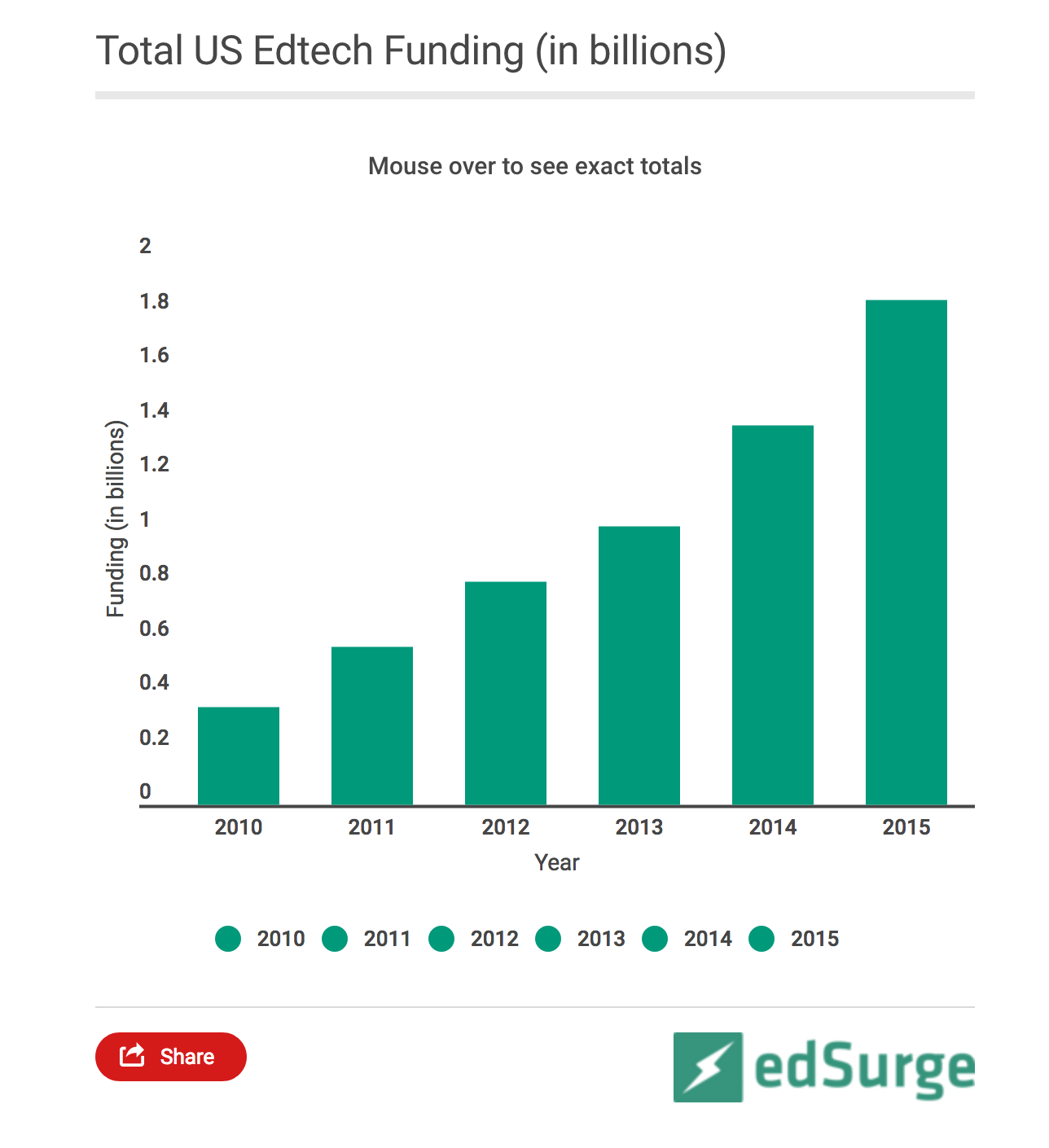Knowledge production has shifted from being framed as a closed system to being an open system, one that is networked, responsive and expanding. (Vaughan, 2017)
To working within the knowledge economy you cannot work within a niche closed process but instead must have the ability to engage and address complex and diverse problems. This process is support by networking and combining knowledge. Current systems within teaching and learning are silos that as the evidence suggests provides nothing more than a digital repository. Many are closed, off the shelf products supported by annual charges inherently inflexible and not adaptable to the needs of these future knowledge workers.
The need for better tools to support the changing economy has seen huge investment in Edutech specifically from Silicon Valley. From 2010 to 2014 there was more than a 503% growth in investment with a major peak in 2015. Venture capital invested in Edutech in 2017 was $3.48 billion (Watters, 2017), there is certainly no let up in investment.

There is a clear history of technology companies operates at a loss with this type of venture capital backing based on potential user volume and then finding a way to sell that data at a later point. The business model of data mining specifically connected to targeted advertising is the main model of operation for this style of VC investment. This general business practice has problematic consequences. A move to data mining as the business model for Edutech is the promise that you can measure (all) learning.
Enslaved to the tyranny of testing and measurement, the affordances of todays technology in EdTech form are being used to develop ever more efficient ways of delivering a 19th century curriculum. https://medium.com/learning-re-imagined/the-edtech-rebel-alliance-65bfd34b8836
If an algorithm is to provide you with a tailored education you will have to give up your data and your privacy to undertake such a education.
This is a model that lead to standardisation, privatisation and centralisation.
xMOOC
Perhaps we have lost sight of what education is for and why we send our kids to school? Essentially we are using today’s digital platforms to go into reverse. We’re talking about content, and teacher at the front distribution while measuring the effectiveness of our tech by improvement in measured learning outcomes for which read, passing tests.
Children given a toy and shown how to use it will “learn” how the toy works, but will not explore beyond what they are shown. This is true even if they simply overhear instructions being given to a child in the same room. Children not given instruction will explore the same toy with a wider range of investigations and will find things that the first groups of children do not find. (Bonawitz et al, 2011, quoted in Invent to Learn)
for-profit internet monopolies such as search engines and social networks (Berners-Lee)
http://www.wired.co.uk/article/tim-berners-lee-reclaim-the-web
it’s not about the technology but the concept of peer learning and peer support should be embedded in good education practice. A system with peer to peer at the heart has the potential to unlock collaboration and foster new connections and knowledge. The web started this way however the visualisation of the web was lost on the way and the centralisation has started.
Search is the prime means of moving through the network owned by Google.
Timelines are the other method of navigating the network owned by Facebook.
Both sets of data are manipulated to the viewer. Context awareness would be useful however this is not the reason for manipulation. The reason is advertising. It could be manipulation. Why is your instagram timeline no longer time based?
gutenburg press
facebook / google data mining
Privacy – aware of the issues
Blackboard old business model
better for sharing / control
we can set up anywhere.
Examples
Sharing is important why P2P
Bibliography
Vaughan, L. 2017. Practice-based Design Research, Bloomsbury Publishing.
http://hackeducation.com/2017/12/30/top-ed-tech-trends-business
